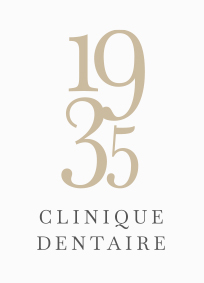Restorative dentistry encompasses procedures designed to restore both oral function and the appearance of your smile. Whether you suffer from issues related to natural wear, accidents, disease or congenital conditions, restorative dentistry offers a complete solution to restore optimal oral health.
In this article, the dentists at our Montreal dental clinic explain in detail what restorative dentistry involves, the different treatment options available, and how these methods can transform not only your smile, but also your quality of life.
What is restorative dentistry?
Restorative dentistry is a specialized field of dentistry that focuses on the complete restoration of the functionality and aesthetics of a patient’s mouth. The process can involve a variety of dental procedures, from dental restoration for individual teeth, to the complete reconstruction of the entire mouth.
Types of restorative dentistry
Full mouth rehabilitation
As the name implies, full mouth rehabilitation involves restoring all teeth. It is used in cases where there is significant tooth loss, a severe deterioration of oral health or major aesthetic issues.
This solution can include the installation of dental implants, crowns, bridges and dentures, and sometimes additional orthodontic treatment.
Partial dental restoration
Partial dental restoration focuses on restoring one area of the mouth. It concerns patients with certain localized dental problems, such as a few missing or broken teeth.
Treatments can include the installation of dental bridges, partial crowns or dental implants.
Restorative dentistry treatment options
Restorative dentistry covers a wide range of treatment options, each tailored to patients’ specific needs. Here’s an overview of the most common options, and a brief look at the pros and cons of each one:
Dental implants
Implants are titanium structures that are inserted into the jawbone to replace the roots of missing teeth. Crowns, bridges or dentures can be attached to these implants.
Advantages: They offer stability and feel similar to natural teeth. They also help preserve the jawbone and are durable.
Disadvantages: This treatment requires a longer surgical process, which is expensive.
Crowns
Dental crowns are “caps” that completely cover a damaged or badly worn tooth. They are used to restore a tooth’s shape, size and function.
Advantages: Crowns can strengthen weak teeth and improve appearances, and are available in a wide range of materials.
Disadvantages: This treatment requires that the natural tooth be partially ground away. Crowns must also be replaced periodically.
Bridges
Dental bridges are installed to replace one or more missing teeth. They are supported by adjacent natural teeth or implants.
Advantages: Bridges can restore chewing function and improve appearances, and they are less invasive than implants.
Disadvantages: Bridges require modifying adjacent teeth, and are less durable than implants.
Orthodontic appliances
These appliances are used to correct malocclusions and to align crooked teeth. They can be fixed (like braces) or removable (like Invisalign).
Advantages: Orthodontic treatments improve bite and appearance, and there are a wide range of options to choose from.
Disadvantages: Orthodontic treatment may take a long time, and demands rigorous oral hygiene.
Restorative dentistry process
Restorative dentistry is complex, and each individual journey is unique. However, any successful dental restoration process generally involves several key stages.
Initial consultation
The first step is a thorough consultation with a specialized dentist. During this consultation, the dentist will assess your overall oral health and discuss your concerns and goals.
Your dentist will perform dental impressions, X-rays or other diagnostic tests to obtain a complete picture of your situation.
Planning your treatment
Based on the information gathered during the consultation, the specialist will draw up a personalized treatment plan. This plan may include various procedures, such as installing implants, crowns, bridges or braces, or periodontal treatments.
Not that the patient is involved in the planning process, to ensure that the final treatment plan meets their expectations and needs.
Restorative dentistry treatment
A complete restorative dentistry treatment may require numerous appointments, depending on the complexity of the procedures.
Modern dental rehabilitation techniques, such as computer-guided implants, crowns fabricated via CAD/CAM (Computer-Aided Design and Manufacturing) and advanced imaging technologies, are often used to guarantee precise, attractive results.
Restorative dentistry techniques and technology
- 3D imaging and digital radiographs
- Advanced restorative techniques such as dental implants and custom-made prostheses
- High-quality materials for crowns, bridges and veneers
Clinique Dentaire 1935 offers top quality restorative dentistry treatments
Restorative dentistry can bring you a fresh smile and renewed confidence. With the right care and treatment, it’s possible to transform not only your appearance, but also your quality of life. At our dental clinic in the heart of Montreal East, we understand what a healthy, attractive smile can mean to you.
Our team of experienced professionals is ready to guide you through every step of your dental rehabilitation journey. We use the latest technologies and techniques to provide you with personalized, high-quality care. Whether you need implants, crowns, bridges or full mouth restoration, we’re here to meet all your dental needs.
Don’t wait to bring your smile back to life! Schedule a consultation today and discover how restorative dentistry can transform your smile and your life.
